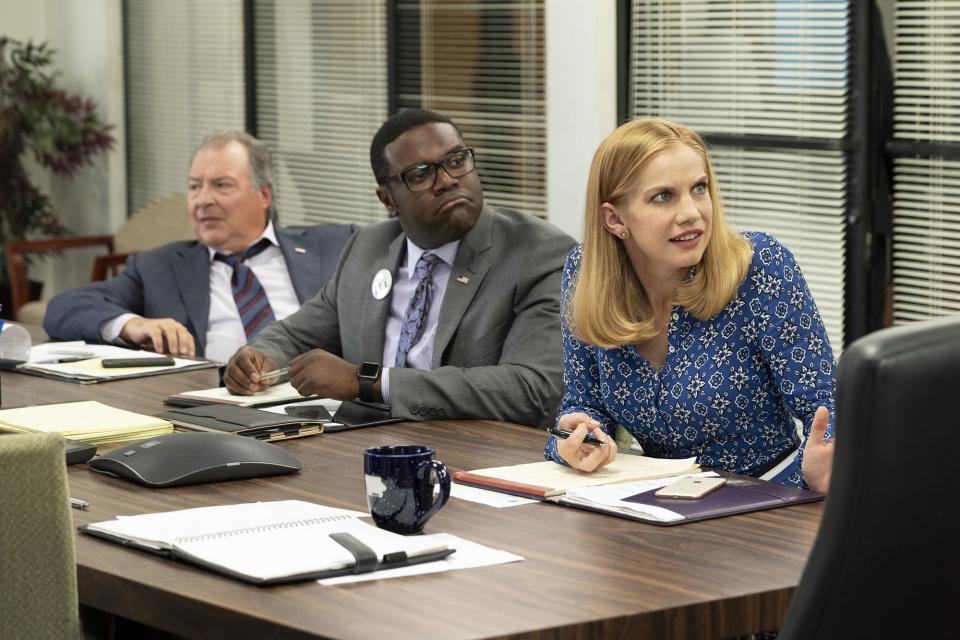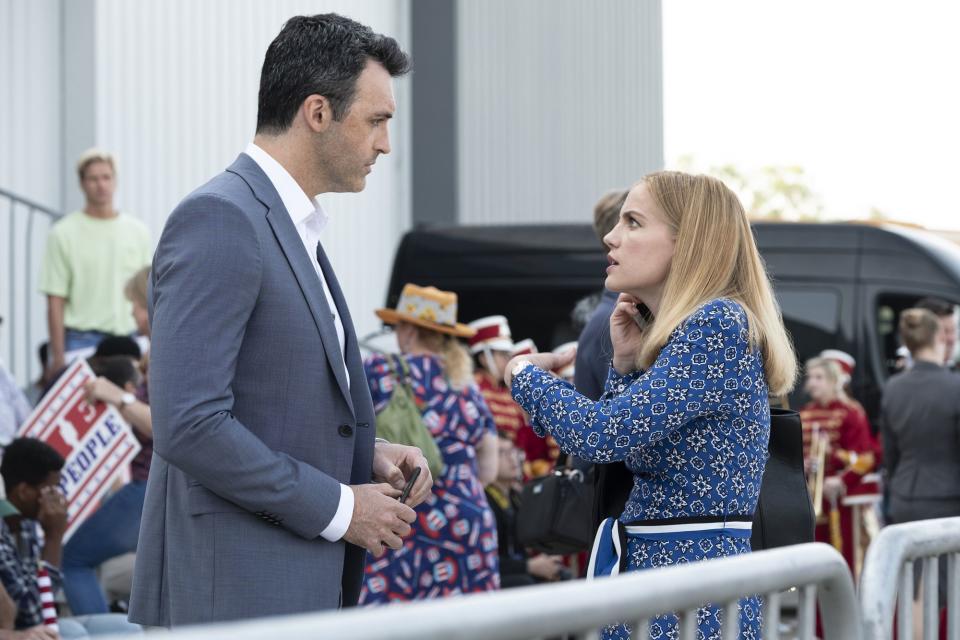Anna Chlumsky: Veep Was Never a Show About Feminism. And It Was Always a Show About Feminism.
Veep has never been a feminist show, Anna Chlumsky tells me earlier this month, when we we sit down to speak about the final season, which premieres this Sunday on HBO. “Our stance, when we began, was very much: We’re not doing a feminist show; we’re doing a show where the character is female, and it’s in politics, so there will be stuff that reflects the absurdity of being a female politician,” she says. But it’s an assessment that strikes me as a little off. Veep has never been unaware of gender politics, either, just stumbling into situations that highlight institutional biases. It’s a show that delights in twisting them into a spikier, saltier, through-the-looking-glass version of themselves.
Selina might not call herself a feminist, but she’s well aware that she’s had to step over more obstacles than her male counterparts on her path to semi-domination. As she puts it in an earlier season of the show, “If men got pregnant, you could get an abortion at an ATM.” And the character played by Chlumsky, Amy Brookheimer, perpetually vying to be Selina’s right-hand woman, offers a kind of mirror of this attitude, masochistically wading in the muck of politics, but rarely doing so in pants. (There are two items Chlumsky—who arrives for our interview in a mom-off-duty look, wearing a hipster sweatshirt with her hair in a topknot—has kept from Amy’s buttoned up wardrobe: a basic dress that she thinks she can “rock with some Converse” while she’s hanging out in Williamsburg, and a U Penn T-shirt beloved by her daughter Penelope, who thinks it’s a tribute to her name.)

Selina and Amy offer a feminist critique that is muttered behind men’s backs more than it’s shouted, delivered in bitter asides more than in polished slogans. Set against the all-encompassing empowerment movement that has gone mainstream over the years that the show has been on, this makes them something of an outlier. (See: Beyoncé, the Wing, Nike commercials, and any other number of corporate-friendly forms of feminism.) In an earlier season, Selina fretted that she couldn’t identify herself as a woman because, well, people hate women. In this season, Selina finds herself (again) running for president against a candidate who so often reminds her crowds that she’s running “as a woman and as a woman of color” that it becomes something like a verbal tic—or, as Selina wickedly puts it while watching a rally, “It sounds like Dr. Seuss fucked Maya Angelou.” Selina only gains a perch when she tells her loud-and-proud female opponent, in a line that becomes something of a campaign mantra, to “man up” and stop complaining about the obstacles she’s faced. “God bless America for hating women almost as much as I do,” she chortles while making her way off the debate stage. Everything changes and everything stays the same.
Perhaps no show has seemed a more of a prescient prism of the cycle of gender-inflected politics than Veep. (When I asked a friend who worked on the Clinton campaign if the show’s satire cut close to home, he wrote to tell me that he thought it was “probably the most realistic depiction of politics ever put on-screen. I can’t tell you how many times during the ’16 campaign we’d turn to each other and say ‘We’re living in a Veep episode.’”) And yet, the show has also tracked some definite turning points. After the 2016 election, there was a sense, Chlumsky tells me, that “no one had the luxury to ignore” the intractable biases and prejudices against women anymore. (The makeup artist for Veep was Hillary Clinton’s makeup artist as well, Chlumsky reminds me, so the cast had a particular kind of front row exposure to some of the appearance-based attacks hurled at Clinton.) And this season, as Amy grapples with the fact of her pregnancy, the show is perhaps more invested in the question of what it means to be a woman in politics than ever before. “We take it far,” she tells me, “We take it to a, like, ugly place.”

But if there is a crassness to Veep’s exploration of the types questions that have mostly been treated tenderly or avoided all together—what do you do when you get pregnant in the middle of a political campaign?—the flip side is that there’s comedy and, above all, a respect for individuality. “Isn’t that the most feminist thing of all?” Chlumsky asks, “just to treat everyone as an individual.” (And to make the experience funny in the meantime.) To prepare for Amy’s pregnancy, for instance, Chlumsky went on something of a listening tour amid her friends and acquaintances. “I had to ask things of women in my life that I’ve never really asked before,” she says. And she did the kind of research she thought Amy would do, asking tons of questions, assembling an armor built from a million Web searches. But above all, Chlumsky’s aim was to create a realistic emotional portrait for a character who’s very body language channels a kind of emotional impenetrability. (Recovering from Amy’s smartphone-addicted posture takes a lot of work from her acupuncturist, she tells me.) “There are going to be plenty of people who make their own interpretation about what we’re quote, unquote trying to do. We’re trying to tell her story. It’s a character. She doesn’t represent any person or any archetype. There’s no agenda whatsoever. Some women are going to really identify with it, and some aren’t”—a statement that has not the sound of satire, but the ring of truth.

